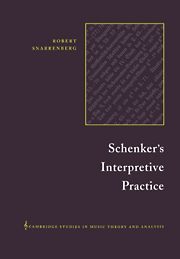Introduction
Published online by Cambridge University Press: 02 November 2009
Summary
It is instructive, and not without an involuntarily comic side-effect, to observe how all these who repudiate hermeneutics – Schenker, Halm, Pfitzner, on down to the most recent generation – themselves become hermeneuts as soon as they start to speak seriously about music.
It has been said that to nineteenth-century Europeans, Beethoven's Ninth Symphony was “a reflecting glass” for the ideological vicissitudes of their century, “always present, hugely, at the center of discourse, inviting the attachment of meanings, almost as though it were a blank surface.”
Blank, reflecting – but what lay beneath this polished surface? What, if anything, was contained in the symphony itself? That is the question that stood before Schenker in the autumn of 1910 as he considered whether to accept an invitation to deliver a series of lectures on the Ninth Symphony to Vienna's Association of Music Critics. In fact, it was the question of content that stood before him whenever he wrote of a musical work, but it was always more sharply defined when the work had become an object of discourse for critics, particularly the “hermeneutic” critics that found the surface of the Ninth Symphony so inviting.
When Schenker looked at what critics wrote of Beethoven's Ninth, he, too, saw a mirrored surface, not in the Ninth but in hermeneutic discourse itself. What he saw in that mirror was a reflection of subjective impression, a reflection that as often as not occluded the music's content. To Vienna's music critics, to hermeneutic critics, and to any who had ears to hear, Schenker proclaimed:
In the beginning was content! (NS vii/4)
- Type
- Chapter
- Information
- Schenker's Interpretive Practice , pp. 1 - 8Publisher: Cambridge University PressPrint publication year: 1997



